 In this article, I will use the American terminology for American football and soccer because I'm just the worst. Sorry.
In this article, I will use the American terminology for American football and soccer because I'm just the worst. Sorry. "Bobby, I didn't think I'd ever need to tell you this, but I'd be a bad parent if I didn't: soccer was invented by European ladies to keep them busy while their husbands did the cooking." - King of the Hill
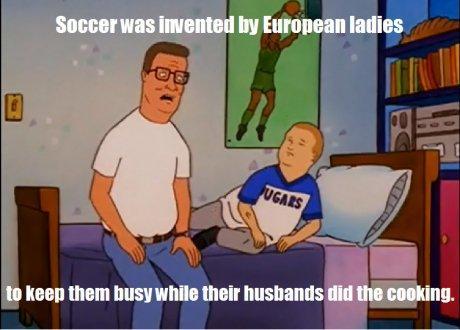
These immortal words from Hank Hill to son Bobby, though obviously exaggerated for comedic effect, best exemplify the American view of soccer. Be it an old-fashioned Texas talking to his newly soccer-curious son or a tired-sounding Sportscenter anchor giving it the ole "we only cover this because we have to" effort, Americans just can't muster much enthusiasm for soccer, at least relative to the nation's other major professional sports. To be fair, some polls suggest millennials now favor soccer over baseball, and as a nation, we'll always rally around the flag for Olympics soccer and relatedly argue over whether the women's team should be paid as much as the men's. But on average, there's an awful lot of Hank Hill in our national response, and a little bit of The Simpsons as well.
Speaking as one such ugly American, though, I admit there is an awful lot about soccer I don't know. So, when I read about a new Netflix series - The English Game - that recounts the sport's rocky early years in the UK I was intrigued. Created by Downton Abbey's Julian Fellowes, The English Game comes to Netflix with the following logline:
In the 1870s, football in Great Britain was a sport for the wealthy. A working-class star and his upper-class counterpart come together to change the game forever.
Huh. Kinda sounds like Leatherheads - George Clooney's ill-fated screwball comedy about the early years of American football - but with a Downton Abbey filter over everything. I didn't exactly love Leatherheads, though. Plus, as a non-anglophile with an innate resistance to costume dramas Downton Abbey was never my thing. So, maybe, just maybe I'm not the guy who should be watching The English Game.
Yeah.
But I'm so hard up for any sports right now I've been watching old, condensed NFL games on PlutoTV. In fact, I have a game on in the background right now. (Will Brett Favre's Minnesota Vikings defeat Aaron Rodgers' Green Bay Packers in 2009, the first time Favre returned to Lambeau wearing another team's uniform? Sure, I could just Google to find out, but where's the fun in that?)
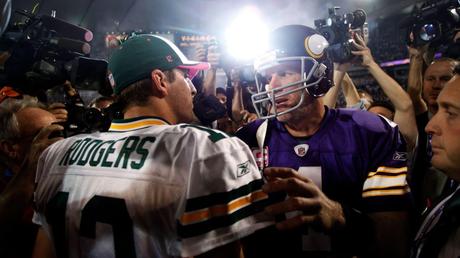
Plus, it's just an embarrassingly American thing of me to know so little about the history of soccer. So, with the caveat that I'm probably not in the exact target audience for The English Game, here's my take on the show:
(Drumroll please)
It's good.
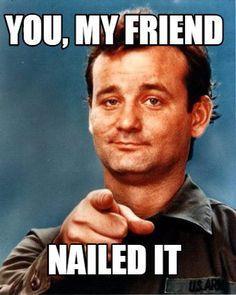
It's that kind of inciteful commentary I strive to deliver for my readers. You're welcome, if that even needs to be said anymore, so overwhelming is your gratitude.
What do ya mean you're going to need a little more than that? "It's good" - pull-quotes don't come any better than that! I'm sorry. I don-oh, come on! How do you miss that holding call? Stupid 2009 NFL refs. Thanks to them, I don't know if Aaron Rodgers can complete his comeback, the young gunslinger striving to take down the old veteran he replaced.
In a game that happened over a decade ago.
Right. So, I might need to turn this off and focus.
Where was I? The English Game. Right. So good, what with all the good stuff that's good about it. Like...seriously, how do you miss a holding call that bla...dammit! I'm doing it again. Serenity now. Serenity now.
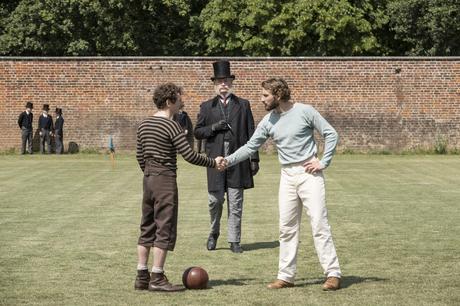
So, The English Game - this show is not truly a sports replacement. The instantaneous thrills and commentary you get out of an actual game, even one from 11 years ago, will not be found here. In fact, there is precious little actual soccer in the first 3 episodes (out of 6 total). Perhaps not surprisingly given Fellowes' Downton legacy, The English Game is more about class than sport. Its central thesis is that those two things - class and sport - are impossibly intertwined.
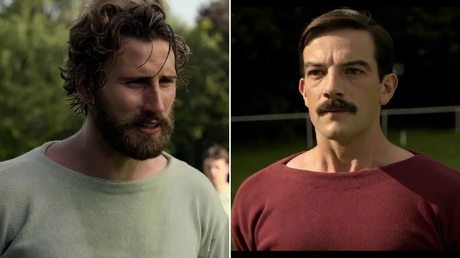
Fellowes, in looking at the sport's early years in Great Britain, saw a story about deceitful factory owners, working-class rebellions, and the palatial intrigue of the ludicrously rich and their disgruntled wives. Thus, we have the dual story of the historical figures Arthur Kinnaird (Edward Holcroft) and Fergus Suter (Kevin Guthrie) - an Englishman and a Scot, a banker and a factory worker...basically, two total opposites united only by their shared status as talented footballers.
Contrary to what Hank Hill once told Bobby Hill, the soccer of The English Game isn't some kind of pox on gender roles. Instead, it's a loosely organized competition between English communities, an amateur side hustle for rich and poor alike. The rich, however, view the sport as primarily belonging to them considering the role played in establishing The Football Association, and they don't much like the riff-raff encroaching on their territory.
What's The Football Association, you might ask? Eh. The English Game assumes you already kind of know. The first episode opens with the following text:
England, 1879.
Football is in its infancy, an amateur game dominated by the upper-class teams who invented its rules.
Arthur Kinnaird, the captain of the Old Etonians, has played in more FA Cup Finals than any other player and won the cup three times.
Until 1879, no working-class team had ever reached the Quarter Finals of the FA Cup.
Cool. Got it.
I can't go any further, though, without acknowledging the following: Edward Holcroft, the actor they cast to play Arthur Kinnaird, is a total snack. He's a British Chris Evans with a constant Infinity War beard, and it is distracting, but in a good "I'm so lost in your eyes" way. Move over Dan Stevens because Julian Fellowes has found another heartthrob for our national horny day fantasies. Cue "Let's Get It On":
 He can bend me like Beckham
He can bend me like Beckham Arthur Kinnaird, despite clearly being a gift to our eyes, isn't the greatest guy. When the working class soccer club adds a supremely talented new player (Fergus) who might tip the balance between the two, Kinnaird changes the rules to ensure his club's victory. When his long-suffering wife miscarries, he treats her like a toxic spill to be avoided. When his "pish-posh" father openly scoffs at his unending fascinating with a child's game, he swallows that anger and hurt deep, deep down inside. A very English repression.
When Kinnaird witnesses firsthand, however, a labor strike and riot, he gains a better appreciation for the necessity of sports to satiate the masses and takes a more active hand in bridging class divides...all while, of course, avoiding honest conversation with his wife.
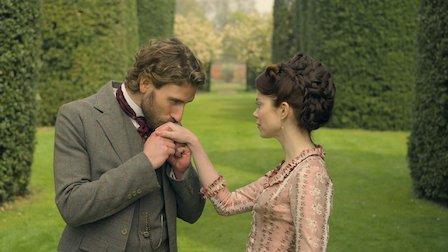 Still, so, so handsome.
Still, so, so handsome. Suter, meanwhile, navigates the tricky terrain of honoring friends and teammates and simply offering his services to whichever factory owner will pay the most for a ringer, meaning he secretly takes money to play soccer at a time when such payments were against the rules.
Together, Kinnaird and Suter will usher the sport into a new era, but to do so they'll collectively have to battle class discrimination and convince the world that people who excel at a children's game deserve to be paid and should be allowed to compete across all social castes.
Sidenote: Those, unlike me, who actually know their soccer history - enough to never ever refer to the game as "soccer" - have been quick to blast The English Game 's piss-poor historical accuracy. We, for example, watch as Kinnaird's wife suffers through a traumatic miscarriage and generally contends with the plight of being a childless woman married to an emotionally distant husband.
Small problem about that since the real Margaret Alma Kinnaird (played here by Charlotte Hope) bore six children, the first two in 1876 and 1879. That means the Margaret of the show worries about life and marriage without children at the same exact time that the IRL Margaret was raising her first child and carrying her second to full term. That's just one example. The show reportedly struggles with basic facts across the board, like correctly identifying which team Fergus actually played for and what he did for a living outside of footballing - a millworker on the show, a stonesman IRL.
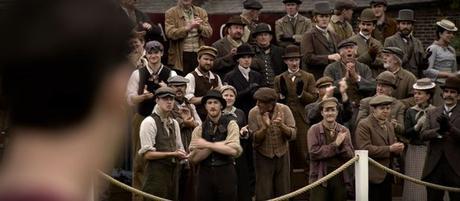
So, don't watch this in substitution of reading about the real history, he says to himself, but The English Game is still a highly enjoyable sports story as told with Julian Fellowes Downton Abbey production values. There are various subplots about scandalous maids and their philandering bosses and plenty of leisurely walk-and-talks through gorgeous Britsh scenery, but The English Game - like any self-respecting sports movie - ultimately builds to a big game where the sport on the field is secondary to the underdog story of the people on the field. In lieu of actual sports on TV right now, The English Game is a worthwhile diversion.
Brett Favre won, if you were wondering. Despite a valiant comeback effort, at one point scoring 10 points in just two minutes, Aaron Rodgers came up short. An onside kick with less than a minute left went to the Vikings, allowing them to kill the clock and walk out of Lambeau with a 30-23 victory. In the storyline of this particular game, the wily old veteran beat the young kid.
I miss sports.
The English Game is on Netflix. Sports will return...at some point.

